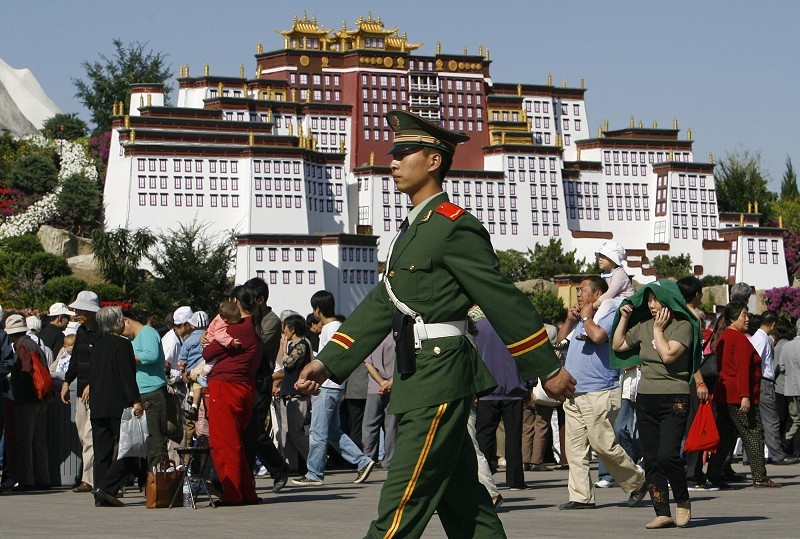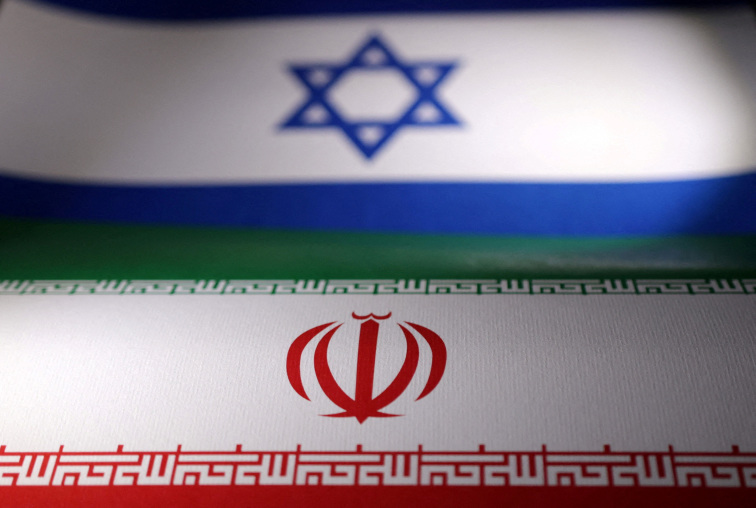Police officers in front of the Potala Palace. (People News)
[People News] Late February this year marked the Tibetan New Year. As per tradition, Chinese Communist Party (CCP) officials from the United Front Work Department met with Tibetan Buddhist leader, the 11th Panchen Lama, Erdeni Chökyi Gyalpo. However, the Dalai Lama, who resides in India, has never recognized Chökyi Gyalpo's position as the Panchen Lama.
According to Chinese state media, on February 13, Shi Taifeng, a member of the CCP Politburo and head of the United Front Work Department, met with Panchen Chökyi Gyalpo in Beijing. Shi urged him to "seriously study Xi Jinping Thought," "strengthen political beliefs," and remain fully aligned with the Central Committee under Xi Jinping’s leadership in thought, politics, and action.
Requiring religious figures, who believe in a deity, to study the atheist doctrines of the CCP is inherently absurd, as the two are fundamentally at odds. This also demonstrates the strict control the CCP exercises over religion and the lack of genuine religious freedom in China.
The CCP’s control over religious organizations has a long history. After establishing its rule in 1949, the CCP launched large-scale crackdowns on religions to promote its atheist ideology, confiscating and destroying religious scriptures across various denominations. Under the guise of “purifying” Buddhist and Taoist communities, many monks and priests were arrested and executed as counter-revolutionaries. Particularly during the Cultural Revolution, numerous temples and Buddhist statues, including those in Tibet, were destroyed, and many monks and nuns were forced to abandon their monastic lives.
While suppressing religion, the CCP also established state-controlled Buddhist and Taoist associations with agents occupying key positions, under the control of the United Front Work Department and the State Administration for Religious Affairs. The CCP’s goal was not to promote religion but to control it. These associations, which aligned themselves politically with the CCP, began interpreting religious doctrines according to CCP ideology. The appointed leaders followed the Party line, secularizing and trivializing religious teachings.
For example, Zhao Puchu, the CCP-appointed head of the Buddhist Association of China, once told followers that "for Buddhists, patriotism and faith are unified," and that "without the Communist Party, there would be no New China. Without the Party's leadership, Buddhists of all ethnicities would not enjoy religious freedom. Therefore, as citizens and Buddhists, we must support socialism and safeguard the socialist system. Religion must adapt to socialism, and socialism must harmonize with religion."
As a Panchen Lama under the CCP's authority, Chökyi Gyalpo naturally must accept CCP leadership. After Shi Taifeng’s “instructions,” Chökyi Gyalpo declared his commitment to "inheriting and promoting Tibetan Buddhism’s patriotic tradition" and vowed to be "a staunch defender of national unity, ethnic solidarity, and CCP leadership."
However, unlike in previous years, Shi Taifeng did not instruct Chökyi Gyalpo to deeply grasp the "Two Establishes" this year, which is rather unusual.
In 2024, Shi Taifeng instructed Chökyi Gyalpo to seriously study Xi Jinping Thought, maintain full alignment with Xi, and deeply understand the "Two Establishes," while strengthening various "consciousnesses" and "self-confidence" and upholding the "Two Safeguards."
In 2023, Shi urged Chökyi Gyalpo to remember Xi’s teachings, stay aligned with the Central Committee, study the spirit of the 20th Party Congress, and deeply grasp the "Two Establishes."
In 2022, then-United Front Work Department head You Quan urged Chökyi Gyalpo to study the "historical lessons from the CCP’s century-long struggle," deeply understand the "Two Establishes," firmly uphold the "Two Safeguards," and remain patriotic in both faith and practice.
Logically, Shi Taifeng should have continued emphasizing the "Two Establishes" this year, but he didn’t. This unusual shift seems to lend credence to rumors of Xi’s weakening power, especially since reports of Xi’s critical illness surfaced in July last year. At the Politburo level, it is likely well-known that Xi’s position has diminished. His "supreme" status has now been replaced by a form of "collective leadership," and the "2442" narrative appearing in some reports may just be a smokescreen.
As for Chökyi Gyalpo’s repeated pledges during meetings to "inherit and promote Tibetan Buddhism’s patriotic tradition," "resolutely support Xi’s leadership," and "not disappoint the Party and the nation," one cannot help but sigh. How can a religious leader devoted to divine beliefs pledge allegiance to an atheist regime? Would the divine ever approve of such actions?
(First published in People News)










News magazine bootstrap themes!
I like this themes, fast loading and look profesional
Thank you Carlos!
You're welcome!
Please support me with give positive rating!
Yes Sure!